What is the Phytosterols Market Size?
The global phytosterols market size is valued at USD 1.20 billion in 2025 and is predicted to increase from USD 1.32 billion in 2026 to approximately USD 2.73 billion by 2034, expanding at a CAGR of 9.52% from 2025 to 2034. The growth of the market is attributed to rising awareness of cardiovascular health and increasing consumer demand for plant-based, cholesterol-lowering functional ingredients.
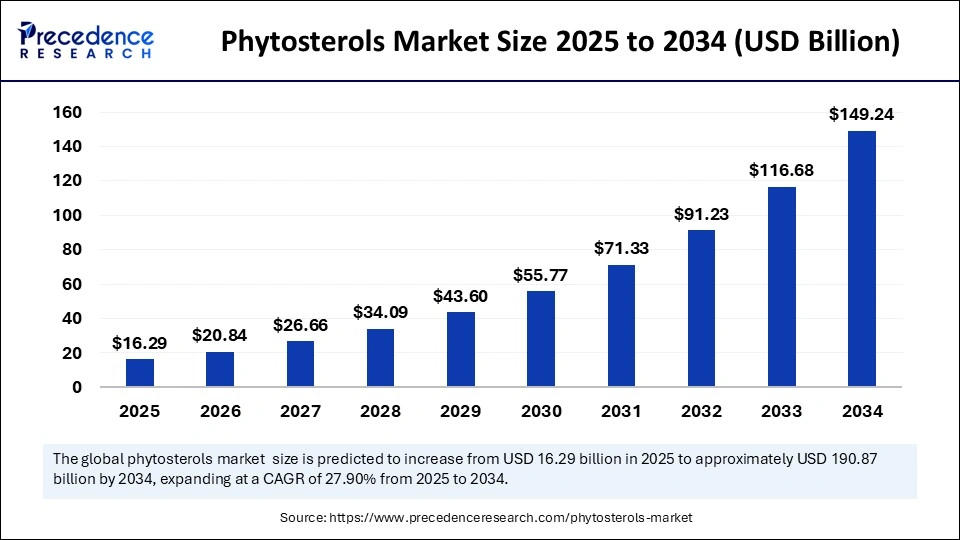
Phytosterols Market Key Takeaways
- Europe dominated the phytosterols market by holding more than 52% of the market share in 2024.
- North America is expected to grow at a solid CAGR of 9.5% in the upcoming period.
- By product, the beta-sitosterol segment held a dominant share of 60% in 2024.
- By product, the campesterol segment is projected to grow at a CAGR of 9.5% in the market during the forecast period.
- By application, the food ingredients segment held the biggest market share of 50% in 2024.
- By application, the pharmaceuticals segment is growing at a CAGR of 9.7% over the studied years.
Market Overview
Increasing awareness of cardiovascular health is likely to boost the demand for phytosterols. These plant-derived compounds, with a similar structure to cholesterol, manage cholesterol levels in the body. These sterols, which generally originate from vegetable oils, nuts, and seeds, are now incorporated more into functional foods, beverages, and dietary supplements. The growing burden of cardiovascular diseases (CVDs) is propelling the growth of the phytosterols market. According to the report published by the World Health Organization (WHO), CVDs are the leading cause of death worldwide, taking an estimated 17.9 million lives each year. Phytosterols present a non-pharmaceutical option supported by the U.S Food and Drug Administration (FDA) and the European Food Safety Authority (EFSA) for their cholesterol-mitigating effects. Furthermore, the rising prevalence of lifestyle-related diseases is likely to support market expansion.
Impact of Artificial Intelligence on the Phytosterols Market
Artificial intelligence (AI) is revolutionizing the phytosterols market through faster innovation, correct formulation, and enhanced characteristics. Manufacturers can use AI-driven tools to analyze intricate botanical information and determine plant origins that contain the most sterols. This is speeding up the development processes of formulations. Machine learning algorithms enable research teams to predict how various sterol compounds affect human biology, which gives the ability to design better cholesterol-lowering products. Moreover, AI improves the quality control of raw materials to identify contaminants or inconsistencies, while guaranteeing safety and following global standards of food and pharmaceuticals.
Phytosterols Market Growth Factors
- Increasing Demand for Functional Foods: Growing consumer interest in foods that support health & wellness is projected to accelerate the adoption of phytosterol-enriched products.
- Growing Geriatric Population: The growing elderly population, particularly in developed nations, is likely to increase the demand for cholesterol-lowering dietary supplements containing phytosterols.
- Supportive Regulatory Approvals: Ongoing regulatory support from bodies such as the FDA and EFSA is anticipated to encourage the incorporation of phytosterols into a broader range of consumables.
- Technological Advancements in Food Processing: Innovations in food processing and phytosterol stabilization techniques are expected to enhance product formulation and shelf life.
- Shift Towards Plant-Based Diets: The global movement toward plant-based eating habits is projected to drive demand for natural ingredients like phytosterols in alternative food products.
- Increase in Preventive Healthcare Spending: Rising healthcare expenditures focused on prevention rather than treatment are anticipated to boost interest in functional ingredients such as phytosterols.
- Demand for Nutraceuticals: The rising demand for nutraceuticals is expected to boost the demand for phytosterols in supplements and health foods.
Market Scope
| Report Coverage | Details |
| Market Size by 2034 | USD 2.73 Billion |
| Market Size in 2026 | USD 1.32 Billion |
| Market Size in 2025 | USD 1.20 Billion |
| Market Growth Rate from 2025 to 2034 | CAGR of 9.52% |
| Dominating Region | Europe |
| Fastest Growing Region | North America |
| Base Year | 2024 |
| Forecast Period | 2025 to 2034 |
| Segments Covered | Product, Application, andRegion |
| Regions Covered | North America, Europe, Asia-Pacific, Latin America, and Middle East & Africa |
Market Dynamics
Drivers
Increasing Health Awareness and Prevalence of Cardiovascular Diseases
The increasing awareness about health & wellness is encouraging people to focus on improving cardiovascular health. This, in turn, boosts the demand for phytosterol-enriched products. People are focusing more on dietary interventions to prevent the risk of CVDs, as dietary issues are linked to the development of CVDs. The popularity of phytosterols is increasing to prevent CVDs due to their lower LDL cholesterol levels. According to the report published by the U.S. Centers for Disease Control and Prevention (CDC) in 2024, about 1 in every 10 American adults is living with high levels of cholesterol in their arteries, underscoring the importance of dietary intervention. Functional food manufacturers are focusing on developing dairy alternatives and fortified cereals with plant sterols. Furthermore, the increasing prevalence of cardiovascular diseases across the globe drives the growth of the market. CVDs are one of the leading causes of death worldwide.
Restraint
Regulatory Hurdles and High Costs
Regulatory hurdles are likely to create challenges in the phytosterols market. Regulatory requirements for health claims and product approvals vary from country to country. Obtaining regulatory approval is a time-consuming procedure, which can delay the time to market. Various nations have different standards for labelling and approvals. Such regulatory changes complicate the approval processes and delay the product rollout. In addition, raw materials required for the development of phytosterols, such as soybean oil and rapeseed oil, are subject to price fluctuations. This significantly leads to the high production costs.
Opportunity
Growing Investment in Functional Foods
The rising investment in functional foods creates immense opportunities in the phytosterols market. Several functional food manufacturers are increasingly allocating more resources toward the research and development of cholesterol-lowering products, including dietary supplements and innovative food formulations. Developments in microencapsulation and emulsification make it possible to integrate better sterols without compromising sensory attributes. The growing geriatric population further fuels the growth of the market. According to the WHO, around 33% of the global adult population in 2024 had elevated cholesterol levels, urging the need for dietary supplements containing phytosterols. Moreover, the growing consumer demand for functional food products and supplements is likely to bolster the growth of the market in the coming years.
Product Insights
The beta-sitosterol segment dominated the phytosterols market with the largest share in 2024 due to its proven efficacy in managing LDL cholesterol levels. It is widely used in functional foods and dietary supplements. It is the most popular phytosterol, promoting heart health. There has been extensive literature and community discussions supporting the cholesterol-lowering effects of beta-sitosterol, which the FDA documented in 2024. Moreover, the increased use of beta-sitosterol in numerous products such as margarine, dairy substitutes, and functional snacks bolstered the growth of the segment.
The campesterol segment is projected to grow at the fastest rate during the forecast period, owing to its ability to reduce cholesterol levels. The growing consumption of plant-based sterols is likely to drive the growth of the segment. Campesterol is one of the most promising ingredients for use in cholesterol-decreasing products due to its ability to decrease LDL cholesterol levels. The rising demand for plant-based functional foods is expected to boost the demand for campesterol, which is derived from nuts, seeds, and grains. According to a study report published by the NIH in 2024, plant sterols, including campesterol, play a key role in promoting cardiovascular health.
Application Insights
The food ingredients segment held the largest share of the phytosterols market in 2024. This is mainly due to the increased demand for functional food products as a result of increased awareness of health & wellness. Phytosterols, like beta-sitosterol, have become an important ingredient in a broad range of foods. They reduce the concentration of cholesterol in food items, such as margarines, spreads, and other dairy substitutes. The WHO recognizes the importance of dietary intervention in the management of heart disease, which further encourages the adoption of phytosterols into everyday diets. Furthermore, the increased consumer awareness about the advantages of plant-based diets to promote heart health bolstered the growth of the segment.
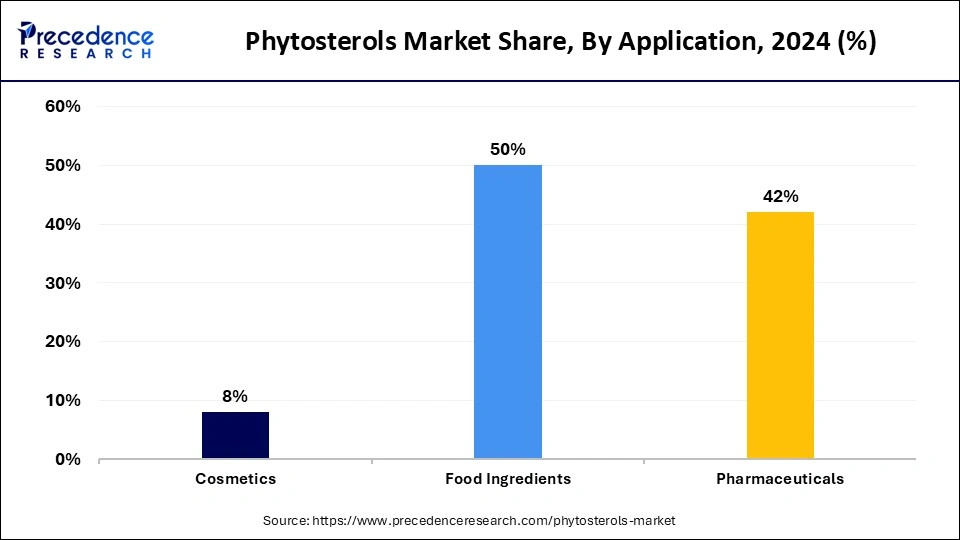
The pharmaceuticals segment is anticipated to grow at the highest CAGR in the coming years. The growth of the segment is attributed to the rising demand for plant-based cholesterol-lowering substitutes. With the rising prevalence of chronic illnesses, including heart disease and hypercholesterolemia, the demand for dietary supplements that contain phytosterols is rising. Since phytosterols exhibit therapeutic benefits, they are widely used in the pharmaceutical industry in the production of therapeutic steroids and as precursors for various bioactive molecules.
Regional Insights
Europe Phytosterols Market Size and Growth 2025 to 2034
Europe phytosterols market size is exhibited at USD 626.68 million in 2025 and is projected to be worth around USD 1,425.33 million by 2034, growing at a CAGR of 9.56% from 2025 to 2034.
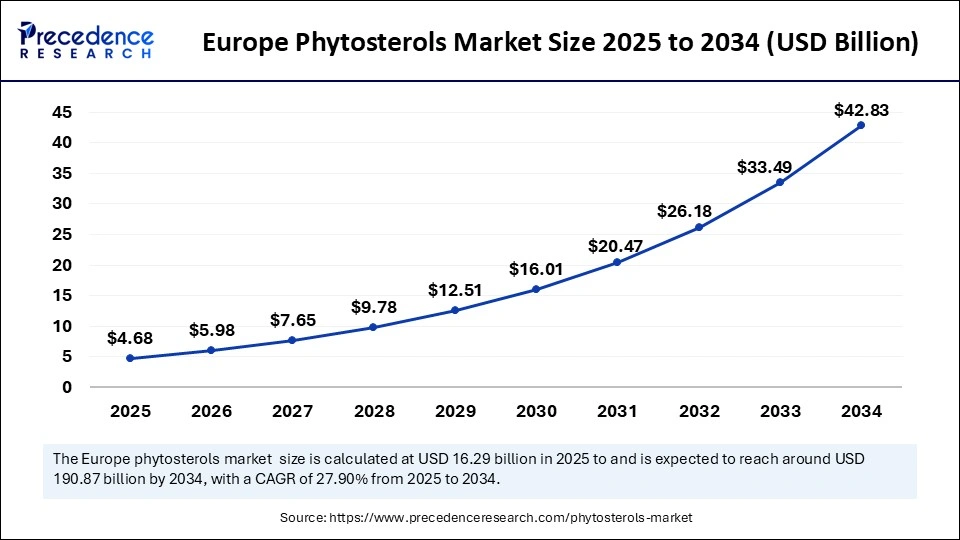
Europe led the phytosterols market by capturing the largest share in 2024. This is mainly due to the heightened demand for functional foods in the region. The region is likely to sustain its position in the market during the forecast period due to the increased burden of cardiovascular diseases. European consumers are rapidly shifting toward natural, plant-based diets. The increased awareness among people about the health benefits of phytosterols in lowering cholesterol further supports regional market growth.
Germany plays a major role in the market. The rising demand for plant-based dairy alternatives and meat is likely to drive the growth of the market. Supportive regulatory frameworks are boosting the availability of phytosterols. France is also a major marketplace. In France, the initiative by the Ministry of Health to promote plant-based nutrition in schools and hospitals further sped up the incorporation of phytosterols. In addition, the rising demand for functional foods and dietary supplements is projected to fuel the growth of the market.
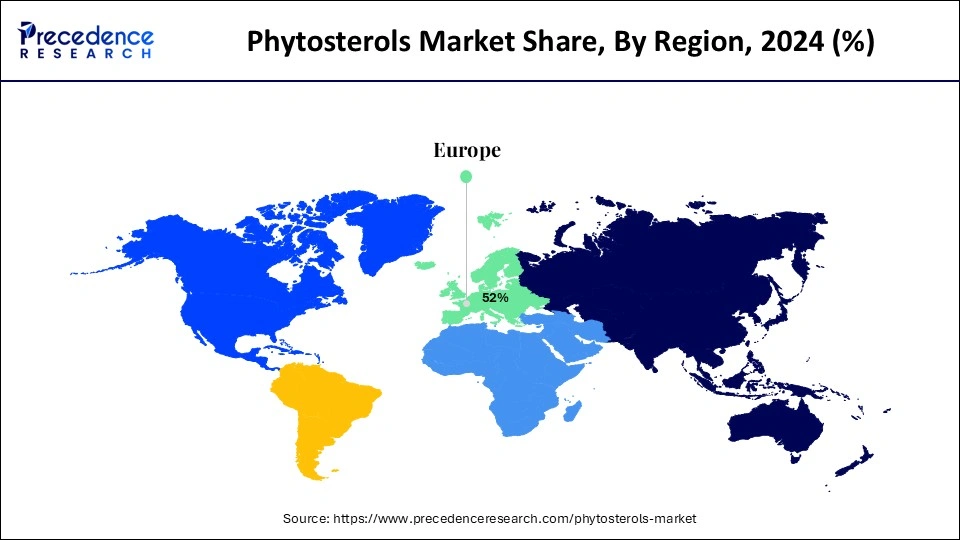
North America is anticipated to grow at the fastest rate in the market during the forecast period, owing to the increased awareness of heart health. This, in turn, is boosting the demand for plant-based diets, creating lucrative growth opportunities for the phytosterols market. The U.S. Food and Drug Administration (FDA) has approved the use of phytosterols in functional foods that are intended to control cholesterol levels. The rising focus on preventive healthcare approaches and the increasing heart disease prevalence are likely to boost the demand for phytosterol-containing foods and supplements.
Asia Pacific is expected to witness notable growth in the upcoming period. The growth of the market in the region can be attributed to the increasing awareness of heart health and the rising prevalence of lifestyle-related diseases. According to the World Health Organization (WHO), cardiovascular diseases are becoming more common in Asia. Japan and China are witnessing significant growth in the consumption of functional foods. In 2024, China's National Health Commission launched a campaign to encourage the adoption of low-cholesterol food, such as phytosterols. Moreover, the surge in demand for plant-based food in India, China, and Japan contributes to the growth of the market.
Phytosterols Market Companies
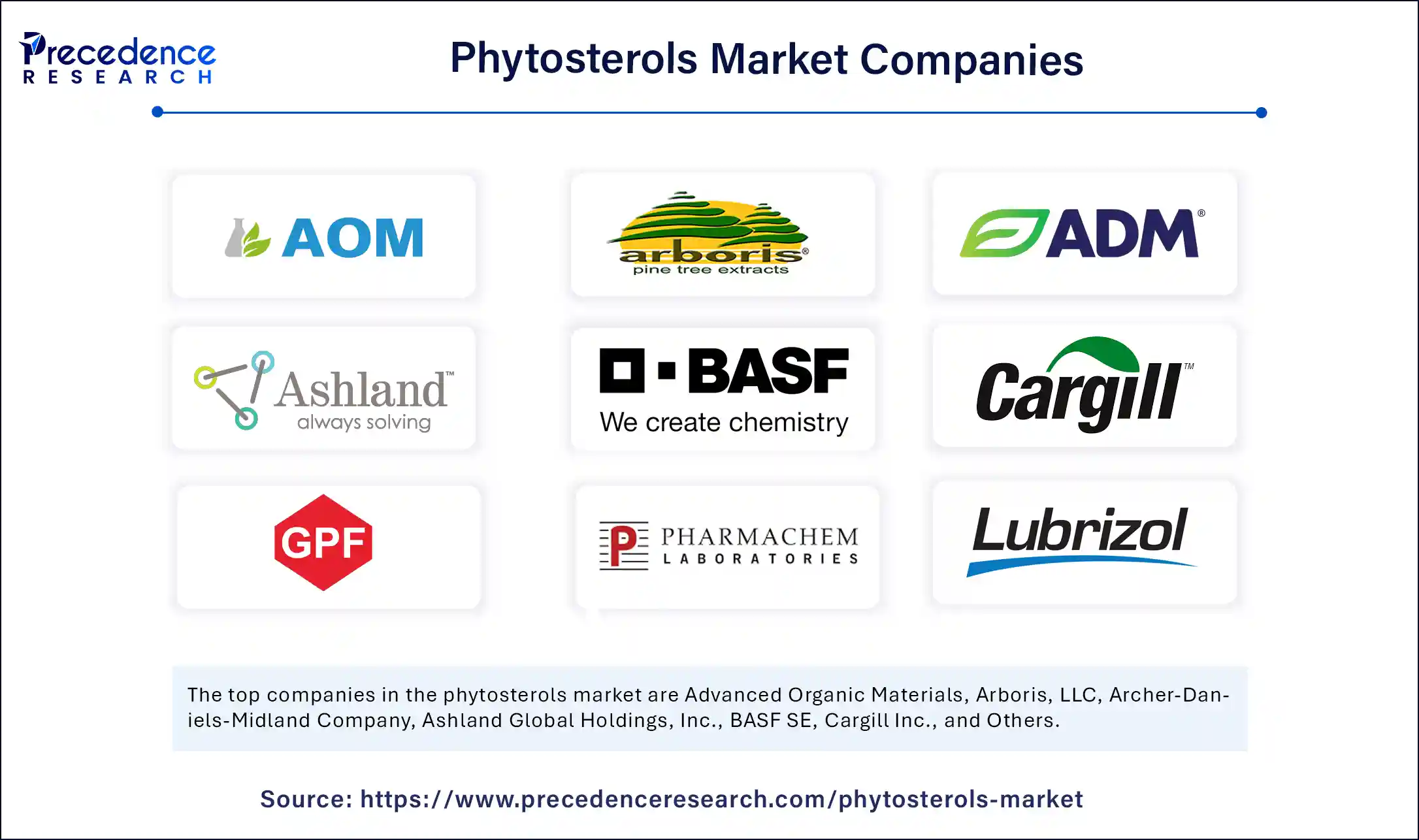
- Advanced Organic Materials
- Arboris, LLC
- Archer-Daniels-Midland Company
- Ashland Global Holdings, Inc.
- BASF SE
- Cargill Inc.
- Gustav Parmentier GmbH.
- Pharmachem Laboratories, Inc.,
- The Lubrizol Corporation
Recent Developments
- In August 2024, Elicit Plant had gained significant traction globally through its EliTerra technology, a patented solution that utilizes exogenous phytosterols to improve stress resistance in major crops. According to Jean-François Déchant, CEO of Elicit Plant, this innovation reduces water consumption by up to 20%, making it a critical tool for addressing the impacts of climate change on agriculture. The technology has undergone extensive field trials and is already being used by farmers in Brazil, Europe, and the United States, with adoption also growing in Ukraine. The company has experienced triple-digit growth over the past two years, solidifying its position as a leader in phytosterol-based agricultural bio-solutions designed to sustain yields during water shortages.
- In October 2023, French agritech start-up Elicit Plant announced the launch of a new phytosterol-based product in Europe aimed at enhancing sunflower yields under water stress conditions. Phytosterols, a plant-derived lipids, activate the natural defense mechanisms of crops, particularly by regulating stomatal function during drought, helping to improve plant resilience to environmental stress.
Segments Covered in the Report
By Product
- Stigmasterol
- Campesterol
- Beta-Sitosterol
- Others
By Application
- Cosmetics
- Food Ingredients
- Pharmaceuticals
By Region
- North America
- Europe
- Asia Pacific
- Latin America
- Middle East & Africa
For inquiries regarding discounts, bulk purchases, or customization requests, please contact us at sales@precedenceresearch.com
Frequently Asked Questions
Tags
Ask For Sample
No cookie-cutter, only authentic analysis – take the 1st step to become a Precedence Research client
 Get a Sample
Get a Sample
 Table Of Content
Table Of Content




 sales@precedenceresearch.com
sales@precedenceresearch.com
 +1 804-441-9344
+1 804-441-9344
 Schedule a Meeting
Schedule a Meeting